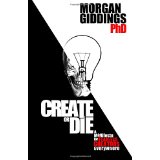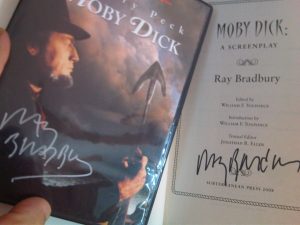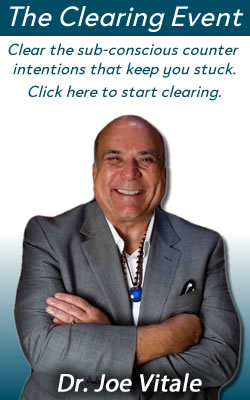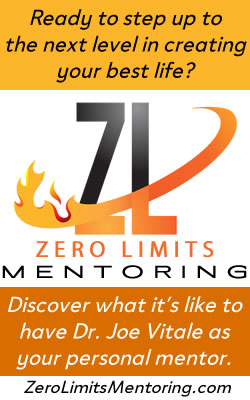Tag: Ray Bradbury
Create or Die
Bob Bly inspired me to become a copywriter back in the late 1980s.
His books, such as The Copywriter’s Handbook, always informed me in a practical way. I began my business career as a copywriter in Houston because of him. He occasionally wrote me snail mail letters of encouragement. I stay in touch with him, too.
Today he is the author of 85 books.
Eight-five!
I remember he once said he felt like he hadn’t produced much – that was back when he had “only” written fifty books – because he knew Isaac Asimov had written or edited more than five hundred books.
Five hundred!
Boggles the mind, doesn’t it?
I’m running as fast as I can to catch up with Bly and Isimov.
Right now I have about fifty books out, am working on two books, editing an autobiography from my father, completing three music albums, working on new presentations for mega-talks I am giving this year around the world, developing a new process for faster attracting, practicing my saxophone, the guitar, and the synthophone, reading more books a week than most people do in a lifetime, and of course still maintaining my fitness program, writing these blog posts, handling social media, promoting my past projects (which is a giant catalog), helping my Miracles Coaches, and more. (And, of course, keeping my relationships alive and well.)
Some say I’m a “force of nature.”
Others say I should switch to decaf. 🙂
Why so much productivity?
What drives a man like Bob Bly or me? What drove Asimov?
An answer is in the new book, Create or Die: A Manifesto for Fearless Creators Everywhere, by Morgan Giddings, PhD.
Her basic premise is that unless you keep creating, you begin to die.
Literally.
Die.
Life is designed to urge you to create, to move forward, to constantly expand, grow, develop, change and challenge.
In fact, challenging yourself is one of the best ways to maintain the exuberance of life.
According to Dr. Giddings, you don’t have a real choice.
Yes, you can decide to “do nothing” but life itself, being the great creative force it is, will move you off your bed if it has to get others to move you and it out the door.
And yes, as Asimov proves, you can create and still die.
But real living comes from persistent creating.
It’s not about the end result – as that will change again in time – but about creating.
There isn’t a “finish line” or even a “perfect” solution.
There will always be something else to create. Another problem to solve.
Life is about creativity. Period.
All of the problems in your personal life – and on the planet – can be resolved with creativity.
Whether oil shortage or climate change or anything else you are worried about, there is an answer, and that answer will come from creativity.
New problems will occur, but that’s just the nature of life’s ever expansion.
And that’s an opportunity for more creativity.
The wise approach is to challenge yourself by choosing your creative projects.
Let your passion lead the way.
Let your enthusiasm for an idea burn bright in your life.
One of my favorite sections in Dr. Giddings’ book is where she reveals the formula for attracting money.
It goes like this:
1. Use your creativity to create something of great value.
2. Use your creativity to effectively communicate the value of your invention, product, or service to others (market it).
That’s it.
She says everything else is just “playing the lottery.”
She also points out that you need a clear idea of what you want money for, and you need to be clear of any limiting beliefs about money, in order to actually have her formula work.
She writes, “Though a surface-level desire for money exists, it gets distorted and watered down by all these other beliefs that are floating around contradicting it. The contradictory beliefs dilute the singular focus that’s necessary for the kind of creative action that leads to results.”
I’m not sure what Bob Bly would say, and the late Asimov is no longer talking or writing, but in my own case, I am driven by the need to communicate what I am excited about.
It’s not about money – it’s about passion.
Money becomes the pleasant side effect of creating value and sharing it with the world in creative ways.
I am driven to create by the impulse of creativity itself.
My hunch is that everyone has this impulse — yes, even you — but most people are pros at rationalizing why they shouldn’t create.
Excuses are easy.
Wimping out is easy.
Just coasting is easy.
The challenge – and the voltage of life itself – comes from creating.
Ray Bradbury, the legendary sci-fi writer who wrote classic books and unforgettable stories – who wrote every day of his life – once said in an interview:
“There’s an Egyptian myth I heard about years ago that when you die as an Egyptian and you go off to visit the gods the first question asked of you at the gates of heaven is ‘Did you have enthusiasm?’ And if you answer negatively you don’t get in. My response to everything in life that I really loved has been enthusiasm.”
You most likely have a desire to create something.
A book, song, movie, business, product.
I have no idea what your secret creative urge might be.
But you do.
Dr. Giddings is giving you a wake up call.
Either create – or die.
And ignore the skeptics, critics, and cynics.
Dr. Giddings writes, “Cynicism is rooted in fear…Worse, it’s toxic to creativity. To be creative, it’s essential to express yourself fully, from your own unique vantage point.”
Critics and the like are living in fear and building themselves up by tearing others down.
Ignore them and pursue your dream.
“Creativity is an inside game,” Dr. Giddings writes. “It’s never about pleasing external critics. It’s about producing something that you feel is great, and then connecting with the right audience who will like whatever it is that you produced.”
I’m sure Bly and Isimov would nod in agreement.
Before I dismiss class today, here’s a final thought to consider:
One of my favorite authors during my development as a writer was Jack London, who once wrote –
“I would rather be ashes than dust!
I would rather that my spark should burn out
in a brilliant blaze than it should be stifled by dry-rot.
I would rather be a superb meteor, every atom
of me in magnificent glow, than a sleepy and permanent planet.
The function of man is to live, not to exist.
I shall not waste my days trying to prolong them.
I shall use my time.”
I agree.
Now, don’t you have something to create today?
Ao Akua,
Joe
PS – I didn’t want to write this post. I was tired, my eyes were blurry, I had other things to do. But the creative urge in me pushed from inside and said “Write this.” I obeyed. And guess what? I am not tired, my eyes are not blurry, and the other things I have to do are next. Follow your creativity. Live your dreams. Expect Miracles.
The Ahab Syndrome
Recently I caught the classic 1956 movie, Moby Dick, based on the famous book by Herman Melville, starring Gregory Peck, directed by John Huston, screenplay by Ray Bradbury. I was reminded of how hypnotic and meaningful the movie is, with symbols about Divinity and messages about the Law of Attraction, and more. I loved it. Always have.
You probably know the Melville book is an American classic first published in 1851. You probably also never read it. At least not all of it. Even Ray Bradbury admitted he could never get through the thing.
I have read it. I’m a fan of the book. I read everything by Melville when I was in college in the 1970s, including Billy Budd, Typee, and The Confidence Man, and even his overlooked poetry, such as Clarel.
But I wouldn’t read Moby Dick today.
Instead, I’d watch the 1956 movie.
Here’s why:
Moby Dick is actually a story about the war between ego and, well, let’s say it: God. Captain Ahab is out to kill God. Yes, the great white whale is a symbol. But everything in life is. In this case, the whale represents the Divine. And Ahab wants it on a stick. Or at least a harpoon.
As Pip says in the movie, “That ain’t no whale; that a great white god.”
But why does Ahab hate God/Whale?
The movie cuts to the chase and tells the story best. Ahab went fishing one day, ran into God in the appearance of a huge white whale, and God/whale challenged him. Ahab lost a leg. Got a facial scar. And was royally upset. He devoted the rest of his life to revenge. Of course, trying to blame God for your life is a losing battle. After all, God’s in control, not you.
And this is Ahab’s problem.
Ahab thinks he can find and destroy God/whale. He bribes his crew with a Spanish gold coin to find the whale. He uses maps and math to help pinpoint the next appearance of the great white.
Along the way Ahab ignores another ship in need of help. Ignores his crew who needs to work. Ignores Starbuck, his first in command, trying to warn him of his choices. And ignores his own mission: to hunt for whales so the world has light from burning their fat.
Listen as Ahab declares how he would “strike out the sun” if it insulted him:
“Speak not to me of blasphemy, man; I’d strike the sun if it insulted me. Look ye, Starbuck, all visible objects are but as pasteboard masks. Some inscrutable yet reasoning thing puts forth the molding of their features. The white whale tasks me; he heaps me. Yet he is but a mask. ‘Tis the thing behind the mask I chiefly hate; the malignant thing that has plagued mankind since time began; the thing that maws and mutilates our race, not killing us outright but letting us live on, with half a heart and half a lung.”
Ahab is pure ego.
He’s hypnotic, as most madmen are.
He’s obsessed, as most madmen are.
And he’s going to fail, as most hypnotic, obsessed, madmen do.
He’s not going to be able to kill “the thing behind the mask” because that thing is God/Divine/Life.
How do we know Ahab failed?
The only reason we know of the story at all is that there was a lone survivor. Ishmael, played by actor Richard Basehart in the movie, is a detached observer. He’s a witness. He’s a reporter of the event. He lives to report the lesson back to us.
Why?
Because you and I need reminded that there is God and there is our ego. When you battle God/Divine/Life/Whale, you lose.
Here’s the lesson as I see it (with apologies to Melville, Bradbury, et al): Accept what happens to you in life as a gift, learn from it, turn it around if need be, and then get on with your life mission.
Feeling resentful, angry, unforgiving and driven by revenge is only going to do one thing: sink your ship.
The secret to living a happy life is to go with the flow. That doesn’t mean roll over and play dead. Put up your sails to use the God-given winds to get you where you want to go, but don’t blame God/Divine/Whale when you hit any bumps in the road. You attracted them as an unconscious dance of energies with life. Just adjust your sails and get back on track. Life goes on.
Beware The Ahab Syndrome.
It’s self-sabotage at the extreme.
What whale have you been fighting, anyway?
Ao Akua,
PS — Here’s sci-fi legend Ray Bradbury giving a misleading (it wasn’t as easy as he claims in this clip) but fun account of how he wrote the screenplay to Moby Dick for egocentric director John Huston by becoming author Herman Melville:
Attracting Kindle
I attracted a Kindle for Christmas. It’s the wildly popular device from Amazon for reading books, magazines, newspapers, select blogs, and more without actually carrying anything more than the thin, light device itself.
I’m such a bookaholic that I wasn’t sure I wanted one. But I’m also a gadget nut and curious enough to try it. So I told Santa and he delivered.
The Kindle is light, intuitive, easy to use, and fast. Mine is the 6″ display, Global Wireless, Latest Generation, which I prefer for all the travel I do, but there is a US only version with a bigger screen (9.7″), called the Kindle DX.
After charging the battery, I turned it on and started using it within minutes. I synced it to my existing Amazon account and wondered what book I should buy first.
Since I had been reading Bruce Lee’s philosophy of living, called Striking Thoughts, I thought it might be cool to have it on my Kindle. I could look at it every day, chew on some Kung Fu (actually Jeet Kune Do) wisdom, and not have to lug the actual book around.
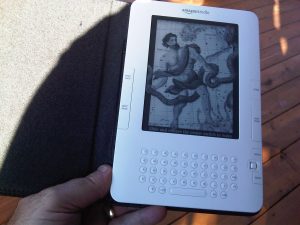 That’s when I discovered not all books are on Kindle. Striking Thoughts wasn’t listed. But a few other books by or about Lee were. I ended up choosing Bruce Lee’s Strength Training Secrets, a booklet by Justin Frost. I’ve always been interested in martial arts (Aikido, Chi Kung) and strength training (Steve Reeves/Hercules), so this would be a good first Kindle download for me.
That’s when I discovered not all books are on Kindle. Striking Thoughts wasn’t listed. But a few other books by or about Lee were. I ended up choosing Bruce Lee’s Strength Training Secrets, a booklet by Justin Frost. I’ve always been interested in martial arts (Aikido, Chi Kung) and strength training (Steve Reeves/Hercules), so this would be a good first Kindle download for me.
It cost less than a dollar. I selected it and within a minute it was on my device. While the look and feel of the text on the Kindle was more like a poor quality newspaper, or even an old mimeograph, and the pictures are more like x-rays, the instant gratification couldn’t be beat. The only thing better might be a direct download into my brain.
Side note: Bruce Lee sometimes trained with a Bullworker, an isometric exercise device I bought when I was sixteen years old — about forty years ago — and still sold today. I still have my original Bullworker, but doubt I’ve ever used it as much as Bruce Lee used his.
I wondered what book I would buy next. I have about $1,000 worth of books sitting in my shopping cart at Amazon. I picked a few of those titles and searched to see if they were available on Kindle. Most weren’t. That was a tad frustrating. But no matter, I was having fun shopping.
I searched again and found the complete works of James Allen (As A Man Thinketh, From Poverty to Power, etc) were ready for download. Called Mind Is the Master, I now have it on my Kindle.
The next book was Keith Cameron Smith’s The Top 10 Distinctions Between Millionaires and the Middle Class. This one has some great insights. As I was reading, I came across a line that was so good I re-read it three times:
“Middle-class people talk about things that came from a millionaire’s idea.”
Thanks to a feature on Kindle, I was able to hi-light that line and save it in my “My Clippings” folder. Way cool. I just wish there was a way to email the things in my clippings folder on Kindle to my Twitter, or blog, or email account. To share it with you here, I had to open the Kindle, open the clippings folder, and then re-type the line for you here. Not a tedious process but in this day I would think we could make it even easier.
Side note: Don’t underestimate the power of Smith’s quote. I told it to Pat O’Bryan and master photographer Rodney Bursiel one evening and their heads reeled as they considered what it meant and I explored the implications out loud. In short, if you want to attract more money, create the products and services that make the middle class talk — and buy.
The next book was Facts Can’t Speak For Themselves: Reveal The Stories That Give Facts Their Meaning by Eric Oliver. This is a book on persuasion for trial attorneys. It’s about how the mind creates stories out of facts, but often without the ending story actually being faithful to reality. To be sure you communicate what you intend, you have to be aware of how people frame information. If you’ve read my books, such as Hypnotic Writing and/or Buying Trances, you know how important it is to get your message across accurately. Oliver’s book is hefty and expensive (even for Kindle) but, so far, well worth the time it takes to absorb it.
Obviously, I’m enjoying my Kindle. It even seems to assist my focus. Instead of reading a dozen books all at once, jumping from book to book on my desk or night stand, Kindle gently leads me to pick one book and keep reading it until I’m done.
I also like that I have a special Kindle e-mail address that I can send e-books to, which then get downloaded direct to my Kindle. Amazon mentions a “small fee” for this service, but I can’t find what that charge actually is.
To test it, I emailed the PDF version of my latest book, Attract Money Now, to my Kindle. It showed up just fine. I then went to Amazon, went into my account, looked up my Kindle charges, and saw the transfer cost was sixty cents. I’d prefer free. I later discovered I can put ebooks on my Kindle for free by plugging the USB port from my PC to my Kindle, and then just dragging the ebooks over. Easy.
On Christmas day, I showed the Kindle to a friend. She quickly figured it out, liked it, and even accidentally bought a book on it. She clicked on a book cover and before she knew it she had clicked on the buy-it-now button. She didn’t know the purchase or delivery would be so instantaneous. Fortunately it was a book on Reiki (The Original Reiki Handbook by Mikao Usui) which I wanted to read anyway.
I like my Kindle. It has some features I haven’t tried yet, such as reading books to you, but for what I’ve done with it so far, it’s cool. I’d like to see it have color, improve its screen, and make it less sterile. I still love printed books and still prefer paper, color, and all the other elements that make a book real.
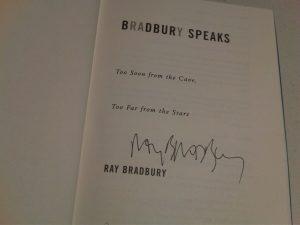 For example, I received two copies of beautiful printed books, one signed by sci-fi writer Ray Bradbury and the other signed by comedian Jerry Lewis. Both came as gifts. Both are hardcovers. Both are collectibles. Kindle will never replace those.
For example, I received two copies of beautiful printed books, one signed by sci-fi writer Ray Bradbury and the other signed by comedian Jerry Lewis. Both came as gifts. Both are hardcovers. Both are collectibles. Kindle will never replace those.
But when it comes to traveling and convenience, the Kindle is great. I’ll be curious to see what the other devices are like, such as Barnes & Noble’s new e-reader, called Nook, which has color and over a million titles to choose from. And geniuses such as Ray Kurzweil are creating ways to read books in full color on any device, with programs such as his new Blio. Of course, I’ll also be waiting to see how Amazon upgrades Kindle over time.
For now, I’ll keep my Kindle. It’s where I can easily find such relevant Bruce Lee gems as this –
“To change with change is the changeless state.”
Right on, Bruce.
Ao Akua,
PS — You can’t yet read my new book Attract Money Now on Kindle (unless you already have the PDF and email it to your Kindle or transfer it over with a direct USB link, as mentioned above), but you can still get the PDF and read it for free by clicking the below banner:

